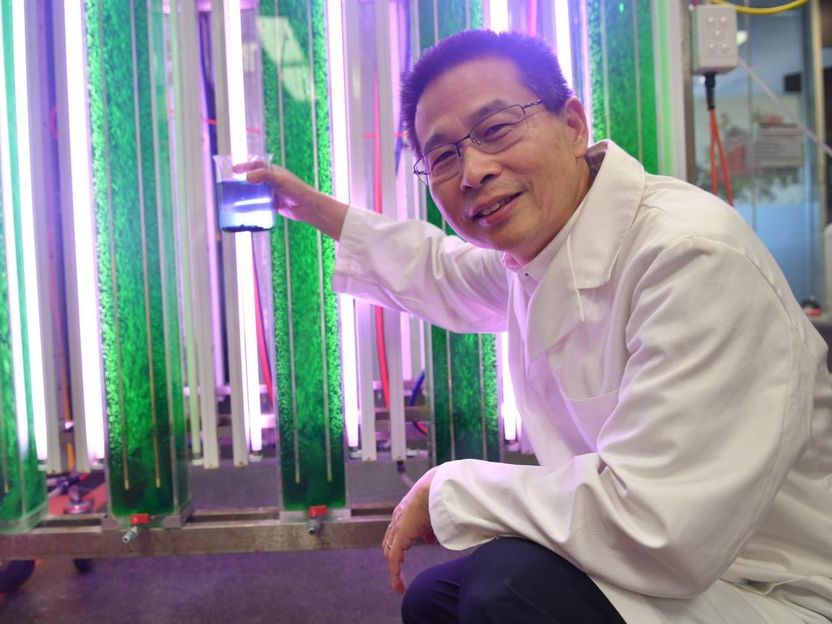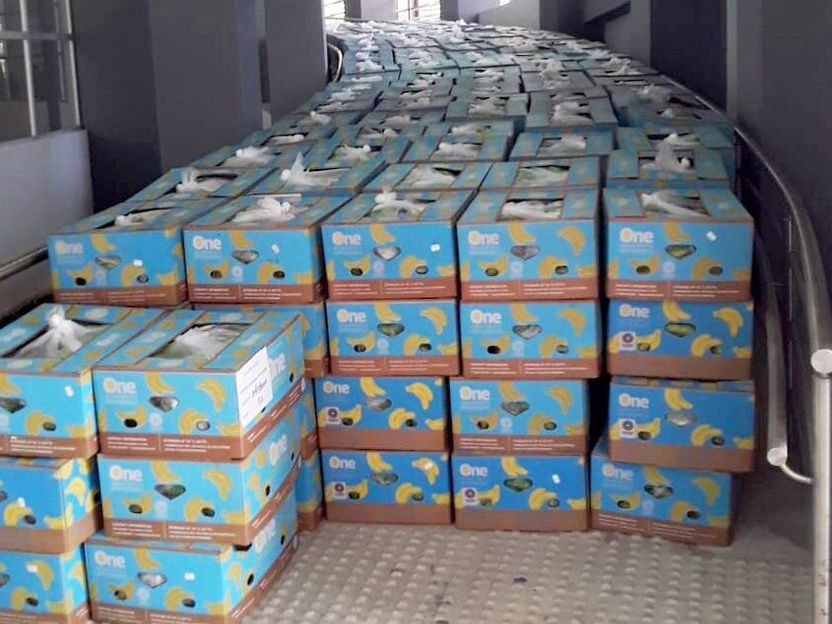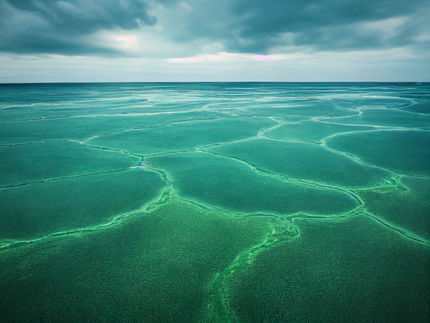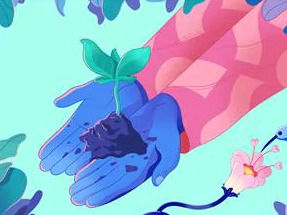Making protein 'superfood' from marine algae
Progress in processing single-cell organisms from the sea
Marine microalgae-based cellular agriculture is a promising new way to sustainably produce plant-based 'meat' and healthy 'superfoods' for the future.

The Flinders University Centre for Marine Bioproducts Development bioreactor and processed microalgae sample held by Professor Wei Zhang, who is co-leading a bid to establish a national Marine Bioproducts Cooperative Research Centre (MB-CRC) in Australia.
Flinders University
Researchers at Flinders University's Centre for Marine Bioproducts Development (CMBD) in Australia are responding to growing interest from consumers looking for healthier, more environmentally friendly, sustainable and ethical alternatives to animal proteins.
Marine microalgae, single-cell photosynthetic organisms from the ocean could be the solution to the world's meat protein shortage, says CMBD director Flinders University Professor Wei Zhang, who is also co-leading a bid to establish a national Marine Bioproducts Cooperative Research Centre (MB-CRC) in Australia.
The CRC's mission is to find ways to develop the third-generation of Australian high-value marine bioindustry (as opposed to the first-generation of fisheries and the second-generation of aquaculture) and transform Australia's emerging marine bioproducts sector into a globally competitive industry.
The Centre's focus will be on industry and market-driven innovations to improve both the supply chain and value chain to deliver costs savings, improved production and competitive capacity for Australia to access high value marine bioproducts markets across the globe.
"Our research spans the entire value chain, from microalgae cultivation and circular advanced biomanufacturing to the development of high-value functional food," Professor Zhang says.
"Microalgae come in a diverse range of nutritional profiles and advanced cultivation strategies can be developed for tuning microalgae to produce protein-, oil- and carbohydrate-dominant types that can be processed into a broad range of functional foods, including healthy cell patties, chips, pastes, jams and even caviar."
Two freshwater microalgal products currently on the market are the high protein Chlorella and Spirulina varieties used in the production of foods such as green pasta, drinks and beverages.
Marine species are of significant interest as they do not require scarce freshwater and crop land. Their unique nutritional profiles such as their high DHA and EPA content (long chain omega 3 fatty acids) are essential for infant and brain development and cardiac health.
Bioreactors for upscaling upscaled aquatic production of photosynthetic microalgae can also help to combat greenhouse gas emissions and climate change. One 90 x 90 x 210 cm (3 x 3 x 7 ft) bioreactor unit can absorb up to 400 times more carbon dioxide than the same footprint of trees.
Using sunlight, certain varieties of microalgae create oxygen and convert carbon dioxide into organic carbon (protein, carbohydrates, pigments, fats and fibres), just like plants, but do not require valuable arable land for their production.
"They are therefore often called the rainforests of the oceans," says Associate Professor Kirsten Heimann, senior lecturer in biotechnology at Flinders University.
"Using sunlight, photosynthetic microalgae create oxygen and convert carbon dioxide into organic carbon (protein, carbohydrates, pigments, fats, fibres, and micronutrients), just like plants, but do not require valuable arable land for their production.
This means microalgae can be sustainably harvested and converted into eco-friendly superfoods," she says. "Putting one and one together, microalgae and innovative production and processing could help to service the world's booming population and growing demand for sustainable protein production," she says.
Along with research into processing techniques, the CMBD team is also investigating the use of waste or harvested seaweed for biodegradable plastics production, another sustainable solution to non-degradable petroleum-based plastics.
Original publication
For the latest paper on microalgae processing development see, 'Release of encapsulated bioactives influenced by alginate viscosity under in-vitro gastrointestinal model' by RE Abraham, P Su, M Puri and CL Raston and W Zhang in International Journal of Biological Macromolecules (Elsevier) Vol 170, 15 February 2021, Pages 540-54
Most read news
Original publication
For the latest paper on microalgae processing development see, 'Release of encapsulated bioactives influenced by alginate viscosity under in-vitro gastrointestinal model' by RE Abraham, P Su, M Puri and CL Raston and W Zhang in International Journal of Biological Macromolecules (Elsevier) Vol 170, 15 February 2021, Pages 540-54
Topics
Organizations
Other news from the department science

Get the food & beverage industry in your inbox
By submitting this form you agree that LUMITOS AG will send you the newsletter(s) selected above by email. Your data will not be passed on to third parties. Your data will be stored and processed in accordance with our data protection regulations. LUMITOS may contact you by email for the purpose of advertising or market and opinion surveys. You can revoke your consent at any time without giving reasons to LUMITOS AG, Ernst-Augustin-Str. 2, 12489 Berlin, Germany or by e-mail at revoke@lumitos.com with effect for the future. In addition, each email contains a link to unsubscribe from the corresponding newsletter.
Most read news
More news from our other portals
Last viewed contents

Small but mighty: the hidden power of broccoli sprouts - Broccoli sprouts have been discovered to contain seven times more polysulfides than mature broccoli

ONE commitment to Health and Safety

Merck Life Science KGaA - Darmstadt, Germany

CABB Group GmbH - Sulzbach am Taunus, Germany

Weisshaar GmbH & Co. KG - Bad Salzuflen, Germany

Evapco Europe GmbH - Meerbusch, Germany

Flying SpArk - Aschdod, Israel

Neogen Corporation - Lansing, USA

CUMUCO BV - WEMMEL, Belgium

Dr. Thiedig + Co - Berlin, Germany

Kleinfeld Labortechnik GmbH - Gehrden, Germany



























































